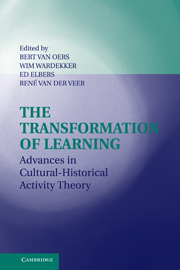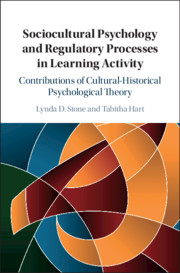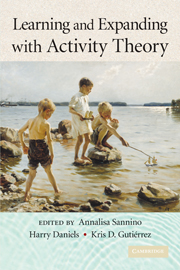The Transformation of Learning
Learning is a changing phenomenon, depending on the advances in theory and research. This book presents a relatively new approach to learning, based on meaningful human activities in cultural practices and in collaboration with others. It draws extensively from the ideas of Lev Vygotsky and his recent followers. The book presents ideas that elaborate this learning theory and also gives recent developments and applications of this approach in a variety of educational situations in and outside of school. A core issue in the research presented in this book consists of the way people learn to make sense of and give meaning to cultural instruments and practices in collaboration with others.
- Presents advances in sociocultural activity theory
- Argues for a different view of learning processes in schools
- View of learning connects school learning and out-of-school learning
Product details
March 2008Hardback
9780521868921
416 pages
234 × 160 × 32 mm
0.69kg
Available
Table of Contents
- 1. Learning and learning theory from a cultural-historical point of view Bert van Oers
- Part I. Tenets of Activity Theory: Introduction to Part I. Exploring Vygotsky's legacy: the meaning of mediation René van der Veer
- 2. Multiple readings of Vygotsky René van der Veer
- 3. Exploring the links between external and internal activity from a cultural-historical perspective Igor Arievich
- 4. Reflections on points of departure in the development of sociocultural and activity theory Harry Daniels
- 5. Language in cultural-historical perspective Peter E. Jones
- 6. The formation experiment in the age of hypermedia and distance learning Hartmut Giest
- 7. Constructivism and meaning construction Ronald Arendt
- 8. Subject, subjectivity, and development in cultural-historical psychology Fernando Luis González Rey
- Part II. Identity, Diversity, and Inclusion: Introduction to Part II. Identity, diversity, and inclusion Wim Wardekker
- 9. Identity shifts in informal learning trajectories Anne Edwards and Lin Mackenzie
- 10. No human being is illegal: counteridentities in a community of undocumented Mexican immigrants and children Jocelyn Solis
- 11. Cultural identity and emigration: a study of the construction of discourse about identity from historical-cultural psychology Beatriz Macías Gómez Estern, Josué García Amián and José Antonio Sánchez Medina
- 12. Diversity in the construction of modes of collaboration in multiethnic classrooms: continuity and discontinuity of cultural scripts Mariëtte de Haan and Ed Elbers
- 13. 'Discourse' in cultural-historical perspective: critical discourse analysis, CHAT, and the study of social change Chik Collins
- 14. Reason and dialogue in education Rupert Wegerif
- Part III. Dynamics of Activity and the Variations of Learning: Introduction to Part III. Learning in social settings: challenges for sociocultural and activity theory Ed Elbers
- 15. Children's learning through participation in institutional practice: a model from the perspective of cultural-historical psychology Mariane Hedegaard
- 16. Dialogue for reasoning: promoting exploratory talk and problem solving in the primary classroom Sylvia Rojas-Drummond, Laura Gómez and Maricela Vélez
- 17. What kinds of tools and resources are made available to students through effective guidance in a student-scientist partnership program? Jrène Rahm, Wendy Naughton and John C. Moore
- 18. Girls on the sidelines: 'gendered' development in early childhood classrooms Sonja de Groot Kim
- 19. Inscripting predicates: dealing with meanings in play Bert van Oers
- 20. Pretend play and preschoolers Ricardo Ottoni Vaz Japiassu.





